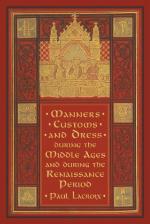The royal apartments were divided into winter and summer rooms. In order to regulate the temperature hot or cold water was used, according to the season; this circulated in the pipes of the hypocauste, or the subterranean furnace which warmed the baths. The rooms with chimneys were called epicaustoria (stoves), and it was the custom hermetically to close these when any one wished to be anointed with ointments and aromatic essences. In the same manner as the Gallo-Roman houses, the palaces of the Frank kings and principal nobles of ecclesiastical or military order had thermes, or bath-rooms: to the thermes were attached a colymbum, or washhouse, a gymnasium for bodily exercise, and a hypodrome, or covered gallery for exercise, which must not be confounded with the hippodrome, a circus where horse-races took place.
Sometimes after the repast, in the interval between two games of dice, the nobles listened to a bard, who sang the brilliant deeds of their ancestors in their native tongue.
Under the government of Charlemagne, the private life of his subjects seems to have been less rough and coarse, although they did not entirely give up their turbulent pleasures. Science and letters, for a long time buried in monasteries, reappeared like beautiful exiles at the imperial court, and social life thereby gained a little charm and softness. Charlemagne had created in his palace, under the direction of Alcuin, a sort of academy called the “School of the Palace,” which followed him everywhere. The intellectual exercises of this school generally brought together all the members of the imperial family, as well as all the persons of the household. Charlemagne, in fact, was himself one of the most attentive followers of the lessons given by Alcuin. He was indeed the principal interlocutor and discourser at the discussions, which were on all subjects, religions, literary, and philosophical.
[Illustration: Fig. 44.—Costumes of the Nobility from the Seventh to the Ninth Centuries, from Documents gathered by H. de Vielcastel from the great Libraries of Europe.]
Charlemagne took as much pains with the administration of his palace as he did with that of his States. In his “Capitulaires,” a work he wrote on legislature, we find him descending to the minutest details in that respect. For instance, he not only interested himself in his warlike and hunting equipages, but also in his kitchen and pleasure gardens. He insisted upon knowing every year the number of his oxen, horses, and goats; he calculated the produce of the sale of fruits gathered in his orchards, which were not required for the use of his house; he had a return of the number of fish caught in his ponds; he pointed out the shrubs best calculated for ornamenting his garden, and the vegetables which were required for his table, &c.




